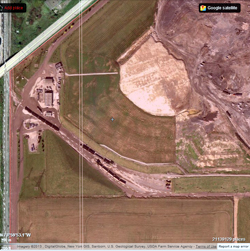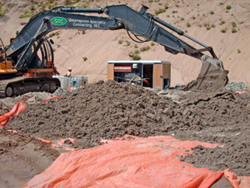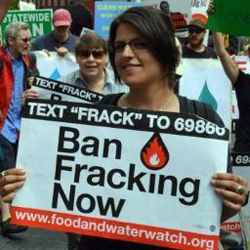Local Landfill Accepting Fracking Waste In Clear Violation of City Ordinance
Back in March 2012, the Niagara Falls City Council unanimously passed an ordinance that prohibits the storage, transfer, treatment or disposal of what is known as fracking waste anywhere in the city.
But as with much that is done by Sam Fruscione and his colleagues, the ordinance has apparently been put on the pay-no- mind list by powerful interests with other ideas.
A recent article by Peter Mantius distributed by the Natural Resources News Service reports that radioactive fracking waste is currently being accepted at the Allied/BFI Waste Systems landfill in Niagara Falls with the approval of the state Department of Environmental Conservation (DEC) and in direct violation of the city ordinance.
The liquid and "mud" waste comes from horizontal hydraulic fracturing, or fracking - two or more miles deep into the earth - of the Marcellus Shale to produce natural gas in Pennsylvania.
Most shale formations contain naturally occurring radioactive material, and although contamination levels vary widely from well to well, the Marcellus formation is suspected to be the most radioactive of all the nation’s shales or fossil rock.
The brine, rock cuttings and drilling mud from Marcellus wells are likely to contain heightened levels of radium isotopes, including Radium 226, which is especially dangerous because it is soluble in water. Earlier this year, state regulators in Pennsylvania launched a study of radioactivity in Marcellus drilling waste, giving drillers in that state further incentive to find dumping options across the New York border. New York has not conducted or planned a similar study.
State Sen. Cecilia Tkaczyk says New York’s approach to importing fracking waste is illogical, given that the state, at least to this point, doesn’t even allow horizontal fracking in its Marcellus shale due to health and environmental concerns. “If we don’t allow fracking in New York due to its environmental downsides, why do we accept fracking waste products from other states?” said Tkaczyk. She has introduced legislation to ban fracking waste imports from other states.
The situation was brought to the council’s attention just last week by Buffalo-based environmentalist Rita Yelda, who has long been active in the effort to keep other state’s fracking waste out of New York.
“The ordinance passed by the Niagara Falls City Council is extremely important due to safety concerns over the wastes’ contents; exposure to drilling waste is extremely dangerous,” Yelda wrote the Council members. “Fracking waste can consist of radioactive material, as well as toxic chemicals used in fracking such as methanol, ethylene glycol, formaldehyde, naphthalene, benzene, toluene and xylene.
“Forty-seven percent of the chemical products used in fracking have the potential to affect the endocrine system and about 30 percent are carcinogenic,” she added.
The possibility of these cancer-causing agents leaching into the groundwater and, ultimately, the city’s drinking water supply, creates a potentially dangerous situation, Yelda told the council.
“Exposure to this waste is not something to take lightly. In 2008, Cathy Behr, an emergency room nurse in Colorado, almost died after being exposed to fluid used in the fracking process,” she wrote. “Due to the largely proprietary nature of the specific chemicals used in fracking, doctors had a difficult time finding out what she'd been exposed to, thereby impairing proper medical treatment. This is the same risk we run by allowing Niagara Falls to be a dumping ground for such waste.”
While the council’s ordinance bans the importation of fracking waste into the city, clarification is needed to provide an effective enforcement mechanism for violations.
Does the Allied/BFI Waste Systems situation fall under the jurisdiction of the city’s Code Enforcement Department or the Niagara Falls City Police Department? No one seems to know.
Last October, the Niagara Falls Reporter uncovered evidence that small amounts of frack water were being stored at the city’s wastewater treatment plant in violation of the city ordinance. Ultimately, the revelation became a minor scandal within the city Water Board, and the results of an investigation were inconclusive.
Clearly, the Allied/BFI situation involves considerably more radioactive waste, which has already been dumped into the ground here.
Niagara Falls Mayor Paul Dyster won’t be of much help. Our supposedly “green” mayor was an enthusiastic supporter of bringing fracking waste into the city for treatment at the wastewater treatment plant, which he saw as a potential financial bonanza for the city.
It will be up to the City Council to figure out how to enforce it’s ordinance, and then to enforce it.


